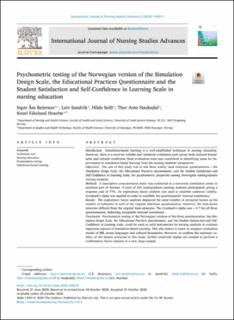| dc.contributor.author | Reierson, Inger Åse | |
| dc.contributor.author | Sandvik, Leiv | |
| dc.contributor.author | Solli, Hilde | |
| dc.contributor.author | Haukedal, Thor Arne | |
| dc.contributor.author | Husebø, Sissel Iren Eikeland | |
| dc.date.accessioned | 2020-11-30T12:36:20Z | |
| dc.date.available | 2020-11-30T12:36:20Z | |
| dc.date.created | 2020-10-25T17:55:06Z | |
| dc.date.issued | 2020 | |
| dc.identifier.citation | Reierson, I. Å., Sandvik, L., Solli, H., Haukedal, T. A., & Husebø, S. E. (2020). Psychometric testing of the Norwegian version of the Simulation Design Scale, the Educational Practices Questionnaire and the Student Satisfaction and Self-Confidence in Learning Scale in nursing education. International Journal of Nursing Studies Advances, 2, 100012. | en_US |
| dc.identifier.issn | 2666-142X | |
| dc.identifier.uri | https://hdl.handle.net/11250/2690219 | |
| dc.description.abstract | Introduction: Simulation-based learning is a well-established technique in nursing education. However, there is a need for reliable and validated evaluation tools across both national boundaries and cultural conditions. Such evaluation tools may contribute in identifying areas for improvement in simulation-based learning from the nursing students’ perspective.
Objectives: The aim of this study was to test three widely used American questionnaires – the Simulation Design Scale, the Educational Practices Questionnaire, and the Student Satisfaction and Self-Confidence in Learning Scale, for psychometric properties among Norwegian undergraduate nursing students.
Methods: A descriptive cross-sectional study was conducted at a university simulation center in southern part of Norway. A total of 105 undergraduate nursing students participated, giving a response rate of 77%. An exploratory factor analysis was used to examine construct validity. Cronbach's alpha was applied in order to establish the questionnaires’ internal consistency.
Results: The exploratory factor analyses displayed the same number of extracted factors as the number of subscales in each of the original American questionnaires. However, the item-factor structure differed from the original item-subscales. The Cronbach's alpha was > 0.7 for all three questionnaires, indicating acceptable internal consistency.
Conclusion: Psychometric testing of the Norwegian versions of the three questionnaires, the Simulation Design Scale, the Educational Practices Questionnaire, and the Student Satisfaction and Self-Confidence in Learning Scale, could be used as valid instruments for nursing students to evaluate important aspects of simulation-based learning. This also makes it easier to compare evaluation results of SBL across languages and cultural boundaries. However, to confirm the construct validity of the factors extracted in this study, further multi-site studies are needed to perform a confirmatory factor analysis in a new, large sample. | en_US |
| dc.language.iso | eng | en_US |
| dc.rights | Navngivelse 4.0 Internasjonal | * |
| dc.rights.uri | http://creativecommons.org/licenses/by/4.0/deed.no | * |
| dc.title | Psychometric testing of the Norwegian version of the Simulation Design Scale, the Educational Practices Questionnaire and the Student Satisfaction and Self-confidence in Learning Scale in nursing education | en_US |
| dc.type | Peer reviewed | en_US |
| dc.type | Journal article | en_US |
| dc.description.version | publishedVersion | en_US |
| dc.rights.holder | © 2020 The Authors. Published by Elsevier Ltd. | en_US |
| dc.source.volume | 2 | en_US |
| dc.source.journal | International Journal of Nursing Studies Advances (IJNS Advances) | en_US |
| dc.identifier.doi | https://doi.org/10.1016/j.ijnsa.2020.100012 | |
| dc.identifier.cristin | 1842092 | |
| dc.relation.project | SHARE - Centre for Resilience in Healthcare: 5091 | en_US |
| dc.source.articlenumber | 100012 | en_US |
| cristin.ispublished | false | |
| cristin.fulltext | original | |
| cristin.qualitycode | 1 | |

